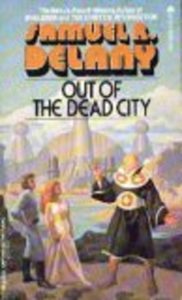Book Review: Out of the Dead City by Samuel R. Delany (originally published as “Captives of the Flame”)
It has been about five hundred years since the Great Fire wiped out the old civilizations. On the island of Toron, however, enough humans and records survived to begin again. A settlement became a village became a town became a city. And when the people of Toron regained the ability to sail the sea, they found a fairly large section of the mainland was still livable, though the people living there were relatively primitive, and proximity to radiation had created two mutant races, the short neo-Neanderthals and tall forest guards.
The people of Toron were able to dominate the mainlanders, and became the Toromon Empire; but by the standards of history, it was a small empire. A belt of deadly radioactive land cut off further expansion on the land, and dangerous currents likewise circumscribed oceanic exploration. To increase their scientific knowledge and study the radioactive death belt, the Empire built a new city nearer to it, Telphar. But not too long after it was constructed, the radioactive area expanded to include Telphar, making it a dead city.
Now the Toromon Empire has air vehicles powered by tetron metal, and has tried flying them over the radioactive barrier–but something is making the engines fail. It’s becoming more obvious that there is someone on the other side of the barrier, someone that certain government officials want to go to war with. But none of them are in the small group of people who know the truth about The Lord of the Flames.
This was Mr. Delany’s second published novel (see my review of The Jewels of Aptor,) and the first of The Fall of the Towers trilogy. (I’ll be following up with the rest at a later date.) This is revised from its earlier publication, as Mr. Delany explains in an author’s note for the trilogy. He thinks it an improvement, but decided not to meddle further after that.
There are a lot of characters for what is a pretty short novel, and it takes a while to work out which ones are important (some come more into focus in later volumes.) Mr. Delany seems to have noticed this, at one point telling the reader to remember a name, and at another point letting us know that another character will play no further role in the story.
Eventually, it shakes out that our male lead is Jon Koshar, a merchant’s son who has escaped from the tetron mines, where he was sentenced for a crime he most assuredly did commit. (The person who instigated the crime refused to come forward and Jon was honor-bound not to expose him.) Jon has come too close to Telphar, and been changed. He is now in communication with a disembodied intelligence known as the Triple Being, which has made him resistant to radiation at the cost of becoming transparent in low light.
It seems that Earth has now become part of the battleground between the Triple Being and their enemy, The Lord of the Flames. The Lord meddles with less evolved beings by puppeteering one of them, evidently for its own amusement, while the Triple Being tries to drive it off while causing the minimum of disruption to the hosts’ civilizations. The being currently being possessed by The Lord of the Flames is behind the strange things happening around the radiation belt, and Jon and the other two humanoids contacted by the Triple Being must stop it.
Since the struggle is happening simultaneously at multiple points in space-time, this involves some trippy scenes where the protagonists inhabit alien bodies for short periods.
There’s also some relatively mundane action going on, such as the abduction of the empire’s heir presumptive, and a series of business competition actions that result in “accidental” mass poisoning.
For 1963, the novel comes off as surprisingly non-sexist beyond the typical occupations of men and women. Content note: there’s a short torture scene.
With so many plot threads, several of which are still dangling at the end of the story (thus the trilogy), this novel feels overstuffed and sometimes lacks focus. As a standalone, it’s a bit lacking, so check back next year for my opinion of the complete product.


1 comment
Comments are closed.